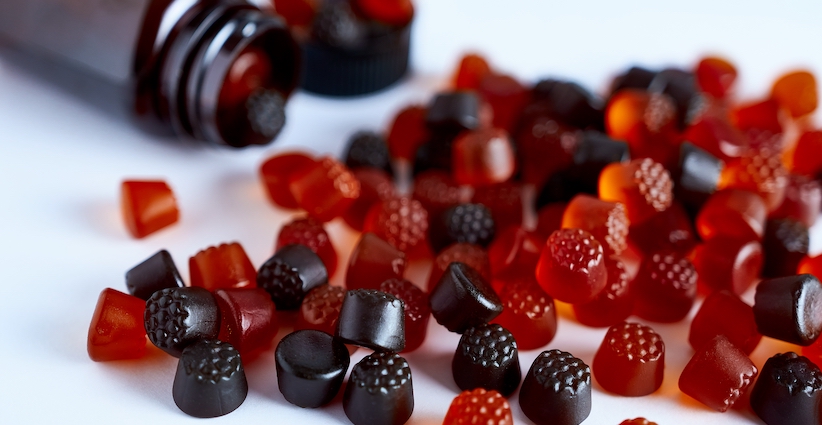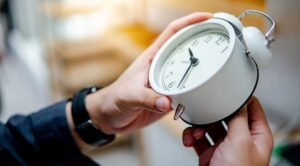Accidental Melatonin Overdoses by Kids Leads to Sharp Spike in ER Visits

According to recent data published by the Centers for Disease Control and Prevention, ingestion of melatonin supplements is a rapidly growing cause of emergency room visits for young children. From 2019 to 2022, melatonin was involved in 1 of every 14 pediatric ER visits related to unintentional ingestion of medications.
Melatonin is a sleep-regulating hormone that the body naturally produces as light levels decrease in the evening. Synthetic melatonin in various formulations is sold as a dietary supplement and is widely marketed as a sleep aid.
Use of melatonin supplements by adults has increased dramatically in recent years, resulting in more melatonin being within reach of children who take it accidentally. According to the CDC data, during the period of 2009 to 2020, emergency rooms saw a 420% increase in visits related to pediatric melatonin ingestion.
Melatonin gummies, which can look like normal candies, were consumed by nearly half of children who visited the ER after ingesting melatonin. In addition, melatonin is not required to be sold in childproof containers, elevating the risk that children can access it.
Looking to improve your sleep? Try upgrading your mattress.
Gastrointestinal problems, including stomach ache, diarrhea, and vomiting, are the most common signs of a melatonin overdose in children. These problems are rarely serious or long-lasting. Studies have found that 98% of children who accidentally ingest melatonin have light symptoms or no symptoms at all, although serious health outcomes or death have been reported in rare cases.
Like adults, some children take melatonin to help with sleep problems, but this usually involves low dosages ranging from 0.2 to 3 milligrams. Evidence to date suggests that these dosage levels are generally safe, though parents should always consult with a pediatrician before giving their child melatonin. However, accidental use may involve exposure to much larger doses.

Whether pediatric melatonin intake is intentional or accidental, inaccurate labeling is a major cause for concern. Researchers have found that many melatonin supplements carry a higher dose than advertised, and some have impurities from substances not listed on the packaging.
When buying melatonin supplements, it’s advisable to look for trusted brands whose ingredients are certified by independent testing. Adults should also take practical steps to prevent children from accidentally ingesting melatonin and other medications. This includes:
- Keeping medications out of reach of children in a place they can’t see or access
- Promptly putting medications away after use by adults
- Using bottles with safety lids or childproof caps and always closing them securely
- Having a system for safeguarding medications when traveling
- Asking any guests who bring medication bottles to carefully store them out of reach of children
Melatonin rarely poses a serious risk to children, but adults should immediately contact a poison control center for information and guidance if they suspect a child has accidentally ingested melatonin. If a child has severe symptoms or a reaction to taking melatonin or any other drug, it’s important to seek prompt medical care.
Got a hot tip? Pitch us your story idea, share your expertise with SleepFoundation.org, or let us know about your sleep experiences right here.
References
5 Sources
-
Freeman, D. I., Lind, J. N., Weidle, N. J., Geller, A. I., Stone, N. D., & Lovegrove, M. C. (2024). Notes from the field: Emergency department visits for unsupervised pediatric melatonin ingestion – United States, 2019-2022. Morbidity and Mortality Weekly Report, 73(9), 215–217.
https://www.cdc.gov/mmwr/volumes/73/wr/mm7309a5.htm -
Owens, J.A. (2023, May 25). Pharmacotherapy for insomnia in children and adolescents: A rational approach. In Chervin, R.D. (Ed.). UpToDate.
https://www.uptodate.com/contents/pharmacotherapy-for-insomnia-in-children-and-adolescents-a-rational-approach -
PoisonHelp.org. (2022, June 7). Recent study shows a 530 percent increase in melatonin overdose in children (What parents should know about keeping children safe)., Retrieved April 1, 2024, from
https://www.poisonhelp.org/2022/06/07/recent-study-shows-a-530-percent-increase-in-melatonin-overdose-in-children-what-parents-should-know-about-keeping-children-safe/ -
Lelak, K., Vohra, V., Neuman, M. I., Toce, M. S., & Sethuraman, U. (2022). Pediatric melatonin ingestions — United States, 2012–2021. Morbidity and Mortality Weekly Report (Print), 71(22), 725–729.
https://pubmed.ncbi.nlm.nih.gov/35653284/ -
Centers for Disease Control and Prevention. (2023, March 7). Protect your children: Store & use medicines safely., Retrieved April 1, 2024, from
https://www.cdc.gov/patientsafety/features/safe-medicine-children.html














































































